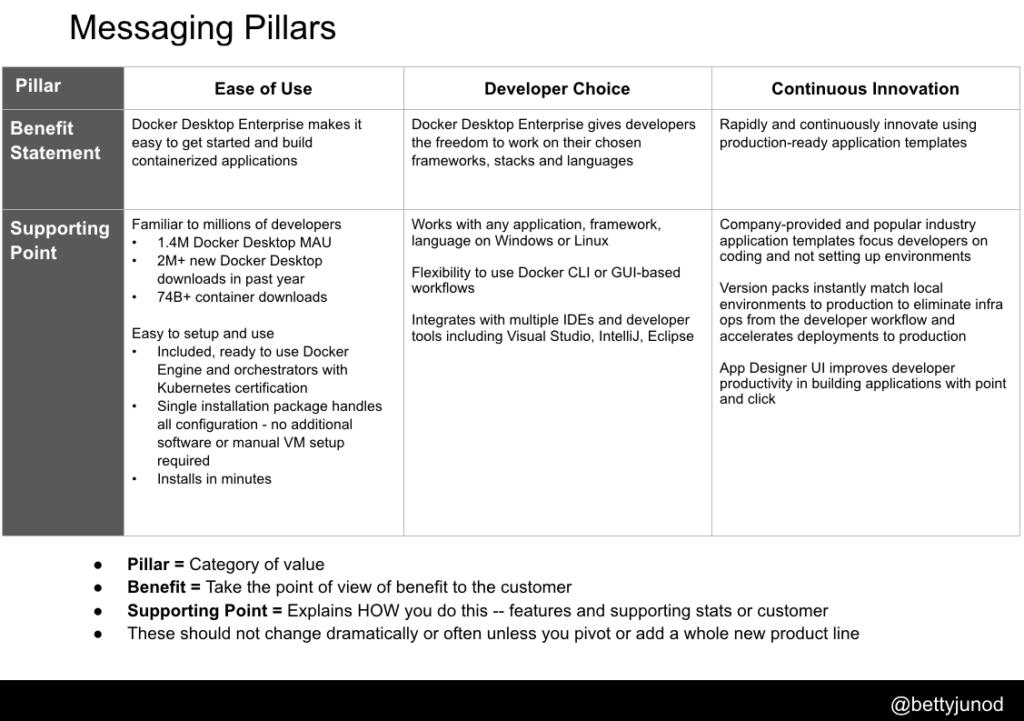Asking for Messaging Feedback
 Ashley Dotterweich
Ashley Dotterweich
You’ve done the hard work of drafting your brand messaging — great! But before you start implementing your new messaging, it’s essential to get feedback from your audience. In her DevGuild: Product Marketing talk on Messaging as the One Source of Truth, solo.io VP of Marketing Betty Junod shared how teams can create and implement messaging effectively. In this post, we’ll dive into Betty’s advice on how teams can ensure they’re getting the feedback they need to put their messaging into action.
Who Should I Ask for Messaging Feedback?
Reporters and analysts. Betty notes that reporters and media analysts like having this type of close relationship with you, and many will provide their feedback as long as you aren’t taking up too much of their time. Asking, “We’re running some messaging changes. Can you take a look?” doesn’t only gives you the perspective of a journalist who knows your space well; it also goes a long way to strengthening your relationship with someone who will provide you with media coverage in the future.
Customers. Customers are, of course, the ultimate audience for for your messaging, so their feedback is critical. If you already have some customers, work on building relationships with one or two so that you can ask for their input. You’ll end up with better alignment with how your users really think about your product.
Customer-Facing Team Members. Another key consumer of your messaging is your team itself. They’re the ones who will use it as the foundation of their interactions with customers, after all. Give your team the opportunity to review your messaging, ask questions and give feedback. As you scale, you can’t control every conversation and every piece of collateral, so it’s essential that your team understands and can use your messaging framework.
Share the Message, Not the Framework
After spending so much time crafting your messaging, you might want to share your messaging framework in its entirety with anyone giving feedback. But this approach can overwhelm your reviewers. Instead of sharing your messaging framework itself, Betty recommends building a three slide pitch deck from your framework and using that to reach out for feedback. This approach will help keep your conversations focused on the areas that matter most.
Ask for Structured Feedback
Being strategic with how you ask for feedback. Asking broad questions like “How was it?” or “Did you like it?” will provide equally vague, unfocused feedback. By being clear and concise with how you present your messaging and ask for feedback, you’re more likely to get more actionable feedback.
Instead, come prepared with open-ended but focused questions that will give you insight that you can build into your messaging. An example of a well-scoped questions for the sample framework shown below might include: “I have these three pillars and we’re waffling on, does ‘ease of use’ sound good or should it be ‘simple’ or ‘fast’ or ‘agile’? What are the terms that you are using the most?”

Think Iteratively
Even after your messaging is “finalized,” you’ll inevitably see some additional feedback trickle in. Plan for regular review cycles to ensure that you’re capturing feedback from the team as your messaging is integrated into marketing collateral, sales pitches, and other customer touch points. You might start out with a solid framework, but iteration based on real-world insights will only make it stronger.
Watch Messaging as the One Source of Truth
Want to learn more about how to tackle about messaging from beginning to end? Watch the recording of Messaging as the One Source of Truth. In this talk, you’ll learn what it takes to craft strong messaging, the process to getting there, the methods to test it, and the best ways to cascade your messaging to other aspects of your organization. Use Betty’s Messaging Framework template to follow along and build out your own messaging framework.
Subscribe to Heavybit Updates
You don’t have to build on your own. We help you stay ahead with the hottest resources, latest product updates, and top job opportunities from the community. Don’t miss out—subscribe now.
Content from the Library
Forget the Moat
“A startup is a company designed to grow fast.” -PG Why Moats Matter for Software Startups Almost every startup burns cash...
How to Train an LLM on Your Own Data: Beginner’s Guide
Introduction to Training an LLM Organizations of all sizes and maturity levels are adopting artificial intelligence (AI)...
How to Drive AI Productivity and Value for Engineering Teams
There’s a great deal of interest in whether AI can (or can’t) provide value by increasing the productivity of engineering teams....